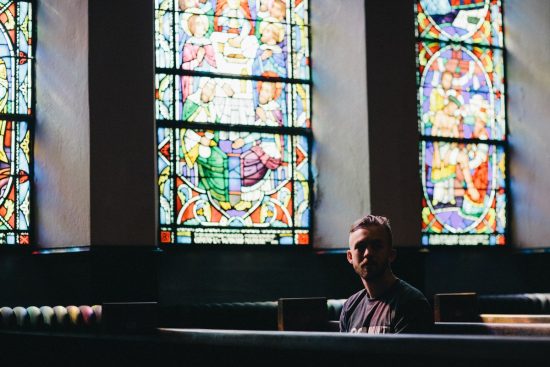Whether you heard about the Seventh-day Adventist Church through a traveling evangelist, during your online searches, or through a loved one or relative, you might be considering joining yourself.
There are a few steps involved in the process of becoming a member of the Adventist Church.
This is a process that happens as the Holy Spirit guides you. It’s best to not rush it. Let the Holy Spirit take you along at His pace.
You may not know much about God as you begin this journey, and that’s okay. That’s what it’s all about—learning about Him and His truth. You’ll want to pray often to talk to Him about what you are learning and thinking. And truly, we never stop learning about God and His goodness, no matter how long we have been Christian.
You may also already have a thriving relationship with God, which is wonderful! Coming to Adventism might be the result of God showing you further truth in the Bible.
But how exactly do you go about joining the church? Do you have to go somewhere or fill out a form?
In this article, we’re going to get into that. We’ll lay out the few steps you’ll want to follow, as well as why they’re important and some other common questions.
We’ll dig into:
- The steps to becoming an Adventist Christian
- How you know you’re ready
- Who is involved in the process to become an Adventist
- How long the process usually takes
Let’s start with what you want to know: the steps involved.
The steps to becoming an Adventist Christian

Photo by Nathan Dumlao on Unsplash
As we said before, the Holy Spirit will be your companion as you follow these few steps to becoming a Seventh-day Adventist. It doesn’t matter if you don’t know anything about God or have already developed a relationship with Him.
You’ll want to be careful not to treat these steps like boxes to check off just to say you did them. You want to be sure you resonate with the things you’re learning—do you believe in these things with your heart? To continue with the process, you’ll want to feel truly convicted.
Now let’s take a look at these steps!
Learn about Seventh-day Adventists
The first thing you want to do is learn about Seventh-day Adventists and their beliefs. As we already said, you never want to go into something blind. You want to spend time researching and understanding before undertaking such a big decision.
You can learn about Adventists through other pages on this site or the church’s main website, Adventist.org. You can also read books published by Adventist publications like Pacific Press or the Review and Herald.
While you’re learning, you may also want to have a Bible on hand to study for yourself the things you read.
You can also request information from your local Adventist Church, which leads us to another step of the process.
Find your local church
When you have become familiar with Adventist beliefs, find your local church and attend Sabbath School and services one Sabbath. And this step doesn’t necessarily have to happen after the first step—attending church can help you as you learn about Adventists.
In visiting a church, you can get acquainted with the church members, who are always glad to have visitors! You can also meet the pastor or head elder.
Attending church also allows you to hear other beliefs you may not have come across in your initial reading.
Request Bible studies
The next thing you’ll want to do is request Bible studies. If you’ve attended your local church, you can ask the pastor or head elder, and they will be more than happy to study with you. You could also ask another church member or Bible worker at the church.
Why do Bible studies when you’ve already been learning about Adventism and the Bible?
This is a chance for you to do a deep dive into Adventist beliefs and how they line up with Bible teachings. You’ll go through the 28 Fundamental Beliefs and look at the core doctrines Adventists believe in. Some of these include the Second Coming, the Ten Commandments, and the state of the dead. You’ll also get a sneak peek at the history of the Adventist Church and its founders, like Ellen G. White.
Not only do you get a thorough, sequential study of the Word of God and Adventist beliefs, but you get to do it one on one with the pastor or another person studying with you. Here, you can ask any questions you may have. No questions are too silly! The person you are studying with wants you to ask questions because it means you’re thinking and want to know more.
When you finish your Bible studies, there aren’t any tests to “pass” them. They are designed to help you study God’s Word and build your relationship with Jesus Christ, not to pass a test. It is up to you to learn all you can.
Make the commitment

Photo by Josue Michel on Unsplash
Once you feel you have a good, solid understanding of Adventist beliefs within the Bible, it’s time to officially commit yourself to your new beliefs. This is done through baptism.
Baptism is a public profession of faith—telling everyone openly that you have adopted belief in Jesus through the Adventist understanding of His Word. Baptism is a celebration—a wonderful time in your life.
In the Adventist Church, you’re baptized by immersion. This means you’re dipped totally underwater—the way the Bible instructs us to be.
On the technical side, baptism automatically makes you a member of the Seventh-day Adventist Church. This gives you a say in church matters and allows you to hold positions in the church, like deacon or treasurer.
If you have already been baptized by immersion into another Protestant denomination, you can also choose to make a profession of faith instead of being rebaptized.
A profession of faith is the same idea as baptism: it’s a formal declaration that you believe in Jesus and want to be part of the Adventist Church. You just aren’t immersed in water, like baptism.
Either at the same time or within the next weeks after your baptism or profession of faith, your church will likely have a reading, or public vote, on whether to accept you as a member. Don’t worry about this step: most people are eagerly voted in!
Why these steps are important
Following these steps is important because they help you understand more about the church you’re joining and the community of believers you’ll be a part of.
You’ll get to meet the head of the community—the pastor—and see how the church functions.
You’ll get to see how Adventists put their beliefs into practice daily. Not to mention you’ll get to learn what everything means and figure out the context behind everything you’ve heard or read.
All of these things will help you thrive in your new-found church community. This is why going through these steps is so fundamental.
But do you have to become a member to be a part of the church?
No, it’s not mandatory. But practically speaking, it’s a good idea if you want to be a part of the church to go ahead and become a member.
Logistically, membership helps keeps things organized in the structure of the church and the General Conference, the worldwide representative body of the church. We live in a world of databases and systems, so having a membership makes it easier in church structure.
But most of all, there is something special about membership. It makes a person feel especially connected to a community and prioritize their commitment there. When you become an official member, you are more likely to be involved, and because of your involvement, you’ll likely feel more like a part of that church family.
How you know you’re ready
As we’ve said earlier, there is no magic formula to determine when you’re ready. You don’t have to be a certain age or a certain economic status. People of all ages, from children to high school age to older people join the church, and people of all walks of life and economic status are welcome.
The Holy Spirit works on our hearts in its own time, little bit by little bit, guiding us to the truth as we are ready to receive it.
But it’s important to be sure of a few things before you make the commitment. You’ll want to accept the Lord Jesus as your Savior. This means recognizing that He alone can save you from sin and death (Savior) and giving Him full authority over your life (Lord and Master).
Also make sure you thoroughly understand our fundamental beliefs as the Bible teaches them, as we outlined in the steps above.
And, most importantly, you will want to feel really convicted of these things. You don’t want to become a member just because your spouse or friend did. You must personally want to believe in your heart the Biblical truths shown to you.
Who is involved in the process to become an Adventist
Normally, this will be the pastor, elder, or Bible worker in your area or local church. They will study the Bible with you and answer any questions you have along the way.
But other support can be great too! Any big decision can be a little stressful. If you have any relatives or friends who are Adventists, go to them for emotional support.
Also, new friends you’ve made at your Adventist Church will gladly give you support and help answer your questions. They will help you feel at home as you go through this big transition.
How long the process usually takes
There is no set time for when to complete the process of becoming an Adventist. It isn’t something that happens at the snap of your fingers. It takes time to learn and study everything.
When we’re learning what Scripture says, we are learning about God (John 1:1). Since God has existed forever, even a lifetime of Bible study is not enough to learn everything about Him. An introductory Bible study, like what you’ll take with a pastor, elder, or other trusted church members, will take time.
For everyone, it’s different. Some complete this process in a few weeks. For others, it takes several months or a year. For others, it might take longer. It depends on your pace.
If you’re chomping at the bit, wondering why certain aspects might be taking too long, keep in mind that God knows what’s best for us. In the New Testament, Jesus tells His Disciples that He knows even when a sparrow falls, and a human is so much more important than a sparrow (Matthew 10:29-31).
Let God work at His own pace, and He will do wonderful things in your life.
The important thing is to focus on what you’re learning, not how long it’s taking.
Becoming a Seventh-day Adventist can’t be a decision of a moment. It’s something that can come only after meditative study of the Bible and inner acceptance of the beliefs presented.
It’s about the state of your heart.
The process we discussed helps you get a well-rounded introduction to the new life you’ll find in Adventism through belief in Jesus.
If you want to learn more about the public commitment to Adventism and what it signifies,
Find a Church
If you’re interested in finding a local Adventist church near you, you can use the Adventist Locator provided by the General Conference of Seventh-day Adventists.
Related Articles
More Answers
Do Seventh-day Adventists Celebrate Holidays?
Wondering whether your Adventist classmate or coworker keeps the same holidays you do? Perhaps you want to include them in some festivities, but you also want to respect their beliefs. Thus, you’re unsure of how to navigate the holiday question. Will they accept your invitation to the office Christmas party?
The Adventist Haystack (It’s Not What You Think) + 4 Recipes
Haystacks are basically a taco salad—with an Adventist spin on it! Most versions are vegetarian and offer an endless combination of tasty toppings. We eat them often because they’re healthy, scrumptious, and easy to make.
Do Seventh-day Adventists Believe in Medical Care?
The Seventh-day Adventist Church believes in and supports evidence-based medical care. In fact, medicine has played a significant part in our history, and today we run a major health system with hospitals, medical schools, and clinics throughout the world.
Why do Adventists Emphasize Religious Liberty?
Adventists see religious liberty as an essential human right. After all, God endowed humanity with freedom of choice from the very beginning. So we believe it’s best for governments to also support their citizens’ rights to worship based on their convictions.
All about Adventist Elementary Schools
The Seventh-day Adventist Church operates the largest Protestant education system in the world. A big part of this system is our K-8 elementary schools, or primary schools, as they’re known in other parts of the world.
What Are Pathfinder and Adventurer Clubs?
Like the boy or girl scouts, Pathfinders and Adventurers learn about nature and life skills. But what makes these clubs special is their purpose to bring young people closer to Jesus.
13th Sabbath Offering: What It Is and Why It Matters
While the previous 12 Sabbaths of the quarter feature an established Adventist ministry and its current giving needs, the 13th is a rotating spot reserved for current mission projects.
A Look at Adventist Colleges and Universities
On the outside, Seventh-day Adventist universities may not look much different than other college campuses. But the real differences are beneath the surface.
What Is ASI (Adventist-Laymen’s Services and Industries)?
ASI, which stands for Adventist-laymen’s Services and Industries, is a membership-based organization that provides support for Seventh-day Adventist laypeople (Adventist professionals who aren’t pastors).
What Are Adventist Evangelistic Meetings?
The Seventh-day Adventist Church puts a huge emphasis on sharing the gospel through evangelism, or sharing the gospel through preaching, teaching, and testimony. One of the ways we accomplish this is by organizing public events called evangelistic meetings.
Christian Summer Camps—A Cherished Adventist Ministry
School’s out, the sun’s shining, and your kids are thrilled to have the summer ahead of them. Then three days in, you hear, “I’m bored…”
Do Adventists Have Their Own Bible?
Adventists have some unique beliefs—you might be able to name some of them right now. The seventh-day Sabbath. Death as a sleep. Hell as nonexistence.
What Is Vespers?
Friday rolls around, and you’re spending time with your Adventist friends or relatives when they mention they’re going to vespers tonight.
Adventist Pastors
What is the role of a pastor in the Adventist Church? The position itself, at least as far as a local congregation is concerned, is not much different from that of pastors in other protestant denominations.
The Leadership Structure of the Seventh-day Adventist Church
The Seventh-day Adventist Church has a representative form of structure that connects its 90,000-plus congregations across the globe and gives its members a part in decision-making. Though the Church was incorporated in 1863, this system came about during the church’s reorganization from 1901 to 1903. It includes four levels of organization.
Everything You Need to Know About Sabbath Meals
For Seventh-day Adventists, sharing a Sabbath meal with friends and family is one of the most special and memorable parts of the Sabbath.
What to Expect When You Go to an Adventist Church
If you’re attending an Adventist church for the first time, you may wonder what it’s really like. While each Adventist church is unique in its collective personality and local culture, Adventist church services are generally similar to most other Protestant church services.
Adventist Education
Seventh-day Adventists have historically upheld the importance of a well-rounded, high-quality education. Instead of a one-size-fits-all approach to teaching and learning, the Adventist Education system operates on the principle of educating the “whole” person.
Evangelism
Evangelism is simply sharing the truths of the Bible with someone else. And Adventists are all into it.
Everything You Need to Know About an Adventist Church Potluck
Every so often, usually on a schedule ranging from once a week to once a month to once a quarter, an Adventist church will have “fellowship dinners,” often casually referred to as potlucks.
The Seventh-day Adventist Hymnal
The Seventh-day Adventist Hymnal is a songbook used worldwide by many Adventist congregations during their worship services. Since its publication in 1985, it has helped foster praise to God while reminding church members of our mission and drawing them closer to Jesus.
Everything You Need to Know about Sabbath School
Sabbath School is the Bible study component of the church program at most Seventh-day Adventist Churches. It’s a time of Bible study on a specific topic or lesson. Instead of listening to a preacher, people interact with one another, making it a great opportunity for building friendships.
What Are Seventh-Day Adventist Sermons Like?
In nearly every Seventh-day Adventist Church, the sermon is the focal point of the main service—similar to many Protestant Christian denominations. It is a time of biblical instruction by the pastor, who shares what they’ve been studying in the Bible and preparing over the previous week.
Who Are Adventists
The Seventh-day Adventist Church—“Adventists” for short—is a Christian denomination of ordinary people who seek to follow Jesus and live out His mission in this world. Established in 1863, we hold to the Protestant principle of sola scriptura, which means the Bible guides everything we do.
How do Adventists choose what to eat?
Food blogs overwhelm the internet; food fads are all the rage; and copycat and healthy versions of food are the subject of many a get-together.
Didn’t find your answer? Ask us!
We understand your concern of having questions but not knowing who to ask—we’ve felt it ourselves. When you’re ready to learn more about Adventists, send us a question! We know a thing or two about Adventists.




























